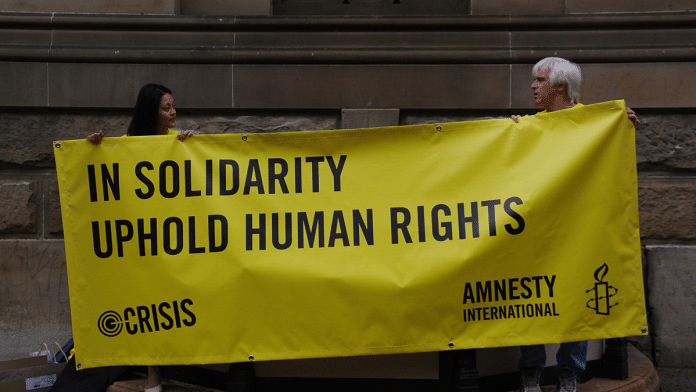New Delhi: Executions were at the highest levels in over a decade in 2024, with three countries from the Middle East responsible for the “steep spike”, according to Amnesty International’s annual report released Tuesday.
The ‘Death Sentences and Executions 2024’ report recorded 1,518 executions in 2024. This is a 32 percent increase from the 1,153 executions reported in 2023—the highest number since 1,634 executions in 2015.
The death penalty became a key tool for Middle Eastern governments to control populations and suppress dissent. Executions for broadly defined terrorism, security offenses, and drug-related activities led to a sharp increase, the report further stated.
In Iran, the death penalty was used against individuals involved in the 2022 Woman Life Freedom uprising, while Saudi Arabia used it to silence political dissent, particularly among the Shi’a minority. Several countries also applied the death penalty for vague “security” or terrorism-related offenses, it said..
Other countries also saw increases, including Egypt (13 executions, up from 8), Singapore (9, up from 5), and Yemen (38, up from 15). The U.S. recorded 25 executions, the second-highest since 2015.
However, executions were recorded in only 15 countries, the lowest number in Amnesty’s records. Bangladesh saw no executions for the first time since 2018, and Oman resumed executions after a gap since 2021.
The report’s figures do not include the executions believed to have occurred in China, which remains “the world’s lead executioner”, North Korea and Vietnam. In all these countries, data on the use of the death penalty is classified as a state secret.
In India, according to the report, the number of people on death row reached its highest level in nearly 20 years by the end of 2024. Moreover, in September 2024, the Aparajita Protection Act in West Bengal introduced a mandatory death penalty for aggravated rape leading to death or a persistent vegetative state, along with a discretionary death penalty for other rape cases. The bill was introduced to impose harsher penalties for rape following public outrage over the rape and murder of a doctor in Kolkata.
Also Read: 10,000+ Indian nationals lodged in foreign prisons, 47 executed in 2020-24—govt tells Rajya Sabha
Middle East leads in deaths by executions
According to the report, the sharp increase was largely attributed to a surge in executions in the Middle East, particularly in Iran, Iraq, and Saudi Arabia.
Together, Iran, Iraq, and Saudi Arabia were responsible for 91 percent of all known executions globally, with Iran alone accounting for 64 percent, it said.
Iran accounted for 972 executions in 2024, an increase of 14 percent from the previous year, and the highest figure since 2015. Of these, 52 percent were related to drug-related offenses, continuing a trend that the country reintroduced stringent drug policies in 2021. The country also saw a massive rise in executions, with at least 63 recorded executions— a nearly four-fold increase from 2023. These executions were all related to terrorism offenses.
Saudi Arabia doubled its execution total from 172 in 2023 to at least 345 in 2024, marking the highest number of executions recorded in any given year.
Executions of women were recorded in several countries, including China, Egypt, Iran, Iraq, Saudi Arabia, and Yemen, the report added.
Broader global, regional trends
The report also noted a decrease in new death sentences globally, with 2,087 recorded in 2024—a 14 percent decline from the previous year’s total of 2,428. This decrease brought the global total closer to 2022’s figure of 2,016. In total, new death sentences were imposed in 46 countries, six fewer than in 2023.
Some countries, such as Cameroon, Gambia, Guyana, Maldives, Qatar, South Korea, Taiwan, and Zimbabwe, did not impose new death sentences in 2024, in contrast to the previous year. Meanwhile, countries such as South Sudan, Sudan, and Uganda resumed imposing death sentences after a hiatus.
The report highlighted a growing trend in several countries of mandatory death sentences being imposed for certain offenses. These included countries like Ghana, Iran, Nigeria, Pakistan, Saudi Arabia, Singapore, and Trinidad and Tobago. In military courts, civilians were sentenced to death in the Democratic Republic of the Congo and Myanmar, while special courts imposed death sentences in countries like Bangladesh, India, Iran, Pakistan, Saudi Arabia, and Yemen.
In Pakistan, the report recorded 117 new death sentences, with 103 related to murder, nine for blasphemy, and the rest for terrorism or drug trafficking. The country also saw a rise in women sentenced to death, including two for murder and one for blasphemy.
In Afghanistan, the Taliban carried out at least four public executions. In March 2024, Taliban leader Hibatullah Akhundzada even hinted at the possibility of public stoning for consenting adults involved in relationships outside of marriage, the report states.
Agnès Callamard, Amnesty International’s Secretary-General, however, expressed optimism about the global trend toward abolition, despite the continued use of the death penalty in certain countries. “The tide is turning,” she said, in the report adding that “it’s only a matter of time until the world is free from the shadows of the gallows”.
(Edited by Tony Rai)
Also Read: In 2024, most death sentences handed out by Indian courts were for murder, not sexual offences




